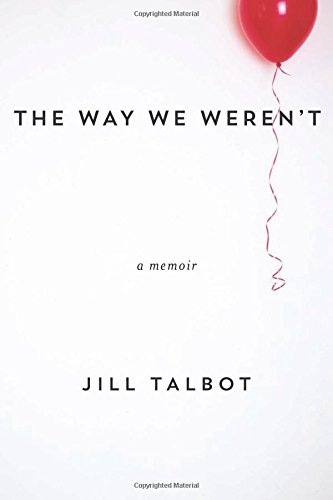I mentioned this to Jill on Twitter, but one of the most amazing aspects of reading her memoir, The Way We Weren’t, was how much I related to her daughter, Indie. Indie and I have not had particularly similar childhoods; I moved between houses when I was young, but they were all basically in the same part of Oregon.
My parents didn’t even split up in similar fashions, or have a similar arrangement afterward. My mother left my father and took me with her after his controlling jealousy and alcoholism began to threaten our safety. After which, he sobered up and sent his check every month until I graduated from college. He came through town sometimes, and I went to stay with him a few times. All this to say, I wasn’t exactly abandoned by my father. But he did move away, and he visited very rarely. I grew up believing that he would be around more if he could, but work prevented it. Once I was an adult, I realized that adults get to decide what limits “work” places upon them and what limits they are willing to accept.
My father doesn’t like any person or thing he cannot control. He prefers “performance” vehicles when he can afford them, doesn’t keep pets or longterm wives, has no other children that I’m aware of, and keeps a sailboat as proof that even the sea can be made to do his bidding. As a child, I was uncontrollable. So, I only stayed with him a few times, and only after age 14.
All that to say that every time the narrator in The Way We Weren’t wondered about what effect Kenny’s leaving might have on her daughter, I felt this hand in me raising high. I wanted to answer her.
I had expected to relate most to Jill’s narrator–the woman in her that once loved a man who left. But now I realize that that was silly on my part. I do the leaving, nearly always. To which Jill responded, “I think when you’re left, the impulse to leave is strong–to beat people to the punch, to avoid being left again.” And yep, I think. Yep.
But Indie will have two different models of leaving from which to build her own propensities. While Kenny left to (seemingly) avoid responsibility, Jill leaves over and over in thrall to it. She is trying to build a life for herself and daughter with some small level of security, even if it only comes in 9 month segments. I get this. Boy, do I, even if I’m responsible for little more than hundreds of books and a lemon tree (and a horse skull and some dishes and a box of artwork and boxes of letters, and mounds of clothes for every possible climate, and snowshoes in hopes of snow and a small beach chair in hopes of beach, etc etc etc–I always feel compelled to admit to my great pile of possessions). Nonetheless, I get reaching for that bit of security that still fosters the creative life, even if it means moving and moving and moving.
This is turning into a terrible review. I’ve hardly talked about the book. Besides acting as an oracle into some of my deepest fears and desires, it is just a wonder of nonfiction. She plays with form, including lists, a syllabus, and redacted correspondence. She uses time and place as organizational elements, but manages to build on the narrative instead of just spinning her wheels after each move (as it feels I’ve begun to do myself). The essays flip between first and third person, which allows her to relate both raw emotion and a kind of “detached” reflection along with the moments of her and Indie’s travels.
Because I’d read earlier versions of several chapters, I loved the insight into the craft of book-building that came from seeing them carefully refigured into the larger narrative.
This is not a light-hearted romp across America with a spunky mother-daughter team. It isn’t that kind of book at all. But it is a book (in part) about how family and home is what you make it. Jill and Indie are forging a a relationship and a life together that has strength and character not in spite of their circumstances, but as a result of them. Which I hate saying, because if I had a quarter for every time my mother told me that some deprivation or unpleasantness “built character” I wouldn’t need any character because I’d be totally loaded. (But here it is true in a way that makes me root for the pair, rather than roll my eyes at my mom.)
The voice of the narrator leads you into and out of some bleak and despairing shit, which I of course appreciate. But she also questions the “truthfulness” of her account. This is one reason I read nonfiction: I want to hear about the way in and the way out, even if “out” is happening somewhere out at the vanishing point. I want to read the story that someone else’s life has told. For me, it’s about marveling at the paths we each chart, the roads we walk, and the life we live in the meantime. But she also tells beautiful stories about falling into and out of love with people, places, and things. It’s a wonderful, searing, and honest book about living with heartbreak on your heels, what that asks of a person and what it gives a person. I know this story, and am comforted to hear someone else sing it.
Verdict: RECOMMENDED (and I need to go on a long walk now)
